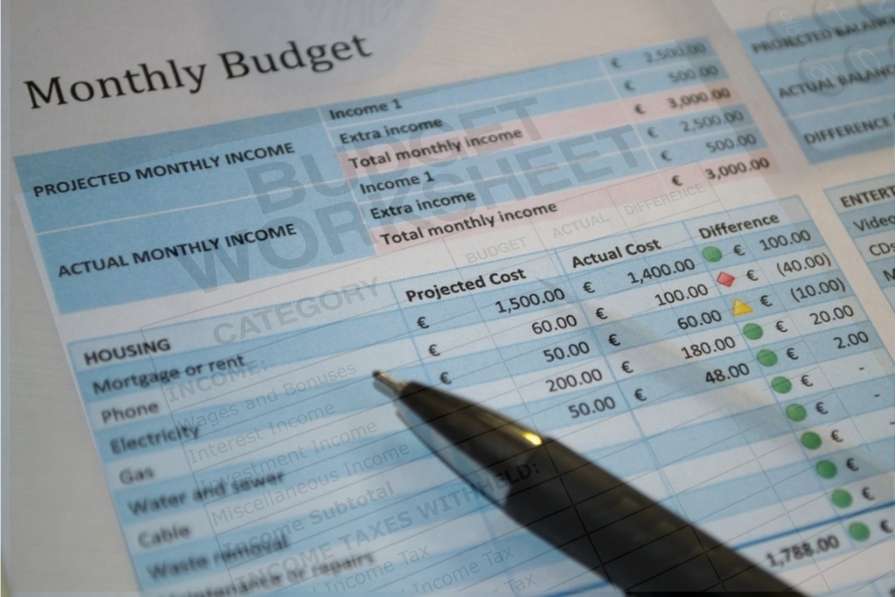5 Top Budgeting Mistakes to Avoid: A Guide to Creating a Successful Monthly Budget

Creating a monthly budget is an essential part of managing your finances effectively, yet many people make common mistakes that undermine their budgeting efforts. Whether you’re trying to save money, pay off debt, or just keep your finances organized, avoiding these common pitfalls can help ensure that your budget works for you. In this guide, we’ll walk through the top budgeting mistakes to avoid, offering practical solutions and tips to keep your financial plan on track.
1. Common Budgeting Mistakes to Avoid
When it comes to budgeting, even small mistakes can have a big impact on your financial health. Some of the most frequent errors people make when planning their monthly budget include:
- Underestimating expenses: Many people focus on major costs like rent and utilities but forget to factor in smaller, recurring expenses such as streaming services, pet care, or hobbies. These can add up quickly.
- Overestimating income: It’s easy to budget based on your best-case scenario, but income can fluctuate due to overtime, commission-based pay, or irregular work hours. Relying on overestimated income can lead to overspending.
- Failing to plan for irregular costs: Certain expenses, like car repairs or medical bills, don’t happen every month but are still necessary to account for in your budget. Without planning for them, you could be caught off guard.
- Not adjusting the budget when life changes: Many people create a budget and stick to it without updating it as life circumstances change. Moving to a new city, getting a raise, or having a baby are all major life events that should trigger a reevaluation of your budget.
Practical Solution:
To avoid these mistakes, take a holistic view of your finances. Regularly review your budget, track every expense (big and small), and adjust your budget as your financial situation evolves.
2. The Impact of Ignoring Fixed Expenses in Your Monthly Budget
Fixed expenses are costs that remain relatively constant month to month, such as rent or mortgage payments, utility bills, and subscriptions. These expenses often make up a significant portion of your monthly budget, so overlooking them—or forgetting to account for increases—can cause significant disruptions.
If you neglect to include your fixed expenses in your budget, you might find yourself underestimating how much money you have left for discretionary spending, which can lead to overspending or a lack of savings.
Common Fixed Expenses Include:
- Rent or mortgage
- Utility bills (electricity, water, gas)
- Insurance premiums
- Subscriptions (Netflix, Spotify, etc.)
Practical Solution:
Always prioritize your fixed expenses when creating your budget. List these expenses first, and account for any potential increases in cost. For example, if your rent is expected to rise after a lease renewal, be sure to adjust your budget accordingly. Doing so ensures that your discretionary spending remains balanced with your essential expenses.
3. How to Avoid Overestimating Your Income in Your Budget
One of the most common mistakes people make when creating their budget is overestimating how much money they bring in each month. Whether you’re salaried or work on a commission basis, it can be tempting to budget based on an ideal income level rather than what you consistently earn.
Overestimating your income can lead to overspending, which in turn can create stress and financial strain. If you budget for more than you realistically expect to make, you’ll find yourself struggling when your actual income falls short.
Practical Solution:
- Be conservative with income estimates: If you have a variable income, it’s wise to use a lower average figure based on your earnings over the past few months or a more conservative estimate.
- Factor in irregular payments: If you receive bonuses, commissions, or overtime, don’t rely on these as guaranteed income. Instead, save these extras or use them for one-time purchases rather than including them in your monthly budget.
By being realistic about how much you bring in each month, you’ll avoid the financial stress of overspending.
4. Why Failing to Track Small Expenses Can Derail Your Budget
It’s easy to ignore small expenses like coffee runs, lunch outings, or subscription services that cost only a few dollars a month. However, when you don’t track these small costs, they can quickly add up, throwing your budget out of balance.
Consider this: If you spend $5 on coffee every weekday, that’s $25 a week, or $100 a month. Over the course of a year, that’s $1,200 spent on something you might not have even thought about.
Practical Solution:
- Track every expense: Use budgeting apps or simple spreadsheets to monitor every expenditure. By tracking both big and small purchases, you’ll gain a clearer picture of where your money is going.
- Consider the “little things”: Small expenses like subscription services (e.g., magazine subscriptions or gym memberships) can be easy to overlook but can add up. Regularly audit your subscriptions and consider eliminating or downgrading those you don’t use frequently.
5. Budgeting Mistakes You Don’t Know You’re Making
Some budgeting mistakes are not obvious, and you might not even realize you’re making them. These mistakes can sneak up on you, causing your budget to be less effective than it could be. A few common ones include:
- Not adjusting for changes in spending habits: Your spending patterns change over time. For instance, if you used to spend less on dining out but recently found yourself eating out more often, it’s crucial to adjust your budget to reflect this change.
- Not planning for emergencies: Emergencies—whether car breakdowns or medical expenses—are inevitable. Failing to account for them in your budget can leave you scrambling for cash when the unexpected happens.
Practical Solution:
- Review your spending regularly: Make it a habit to review your budget and spending every month. Look for any changes in your habits and adjust accordingly. If you’re spending more in one category than planned, cut back in another area to make up for it.
- Create an emergency fund: Setting aside money for emergencies can prevent a budget derailment. A good rule of thumb is to save 3-6 months’ worth of expenses for unexpected situations.
6. How to Build a Flexible Budget That Works for You
One of the biggest mistakes people make is using a rigid budgeting system that doesn’t allow for flexibility. Life is unpredictable—expenses fluctuate, income changes, and emergencies arise. A budget that doesn’t account for these shifts can feel restrictive and frustrating.
Practical Solution:
- Allow for wiggle room: Instead of creating a strict “zero-based” budget where every dollar is accounted for, give yourself some flexibility. For instance, set aside a certain amount for entertainment or leisure that can vary each month depending on your circumstances.
- Use a percentage-based approach: A more flexible system could involve allocating percentages of your income to different categories, like 50% for essentials, 30% for discretionary spending, and 20% for savings. This approach allows room for changes without completely derailing your finances.
Example:
- Fixed Expenses: 50% of your income
- Discretionary Spending: 30% of your income
- Savings: 20% of your income
Final Thoughts
A successful monthly budget is all about making informed decisions and avoiding common mistakes. By being mindful of fixed and variable expenses, tracking every expenditure—large and small—and adjusting your budget to account for changes, you can ensure your budget is both realistic and sustainable. Remember, budgeting isn’t a one-time task—it’s an ongoing process that requires regular review and adjustment. By staying flexible and committed to making smart financial choices, you’ll be on your way to achieving your financial goals with confidence.






